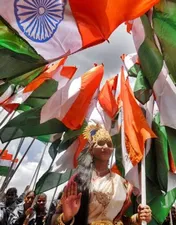A conversation with any Indian aged fifty years and above, has one common remark, ‘India has changed, it is different now, it is no more what it was like when we were kids’. Indeed, if it is being said by majority of Indians, then why ask for justification, it is self-explanatory. In its eighth decade now, India has had mindboggling progress in each of its decade. On one hand we have heard of commissions being set up, institutions being created and revolutions green and white emerging as blessings for the masses. But there also were acts likedevaluation, wars with neighbours, and of-course sudden changes in the leadership which not only depressed Indians but also compelled them to question if they were selecting a right person as their representative, All said and done, the energy invested did bring in structural density. In the midst of various blows to the economy, which has happened at some point in time in all decades, we had many institutions and mechanisms to fall back on. Self-sufficiency is not enough a term to clarify the status, what is more prominent is the capability today to support its neighbouring countries in times of distress.
Examples are many, from Bhakra-Nangal to Bhilai, from IITs to IIMs, from basic tax reform to GST, to Indian Industries taking over some of the giant groups in the world. There have been many surveys and reports that question the state of happiness and satisfaction of an average Indian. Because the recent decades have also gifted us with air pollution, climate change, earthquakes and natural disasters that have been causing us a longer-term distress. While the per capita internet connections can brag about the utilization of technology by Indians, we are equally worried about every child who is using technology for not so right reasons. The divide witnessed in rural, tribal and urban regions is equally concerning, because on one hand we feel for the grassroots we have lived by in our childhood and on the other we find it impossible to go back to the slowness of life in remote locations.
And lastly, we have always struggled for a life in a democratic society which should ideally include equality in all the aspects, social, economic, cultural and political. And the struggle continues, little differently in the changed India. The divide is not just about money, it is about technology, opportunities and much more.
India has definitely changed in the frontier areas of science and technology, education, manufacturing, trade and commerce so much so that the country has emerged as a strong nation capable of standing on its own strength. But we have miles to go, as large number of people yet remain below the line of poverty and millions do not have even basic needs required to live properly, alongside ignorance, illiteracy and disease. It is time we bring those who are willing, have the character and concern to participate and contributeto all possible dimensions of progress through their education, intellect and funds.
Dr. Benazir Patil is The CEO, SCHOOL (Society of Community Health Oriented Operational Links) India.


